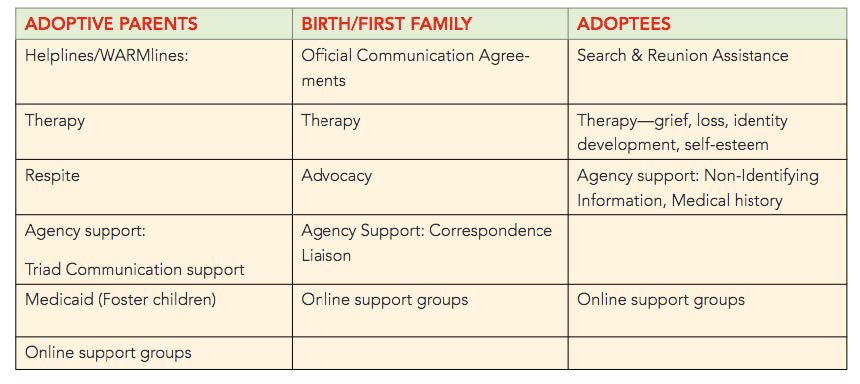However we spin it, I am his mother. But so is she. Two parallel truths that everyone – the birth parents, the adoptive parents, and the maturing child – will all have to reconcile at some point in their lives.
– Ashley Mitchell, founder of Lifetime Healing Foundation (quote from an article posted for the NFCA in 2017)
Ashley Mitchell, a driving force in the modern re-evaluation of post-adoption support, is a birth mother who has dedicated her life to ensuring accessibly of post-adoption support for birth mothers nationwide. Through hearing Ashley’s story and others like hers, we have been inspired to continue learning and growing in our role as adoption professionals. We find ourselves dedicated to the cause of providing quality post-adoption support for the entire triad, while simultaneously developing a network of support and relationships with other agencies committed to this same mission.
To learn more about open adoption and other related topics, check out our previous articles here.
What kind of Post-Adoption Support does AdoptionWorks and ChristianWorks provide?
At ChristianWorks, we take the call seriously to support the adoption community with post-adoption resources.
Our free support groups for adoptive families and birth mothers are open to the community at large. We also offer sliding scale counseling services for individuals across the lifespan who are part of an adoption triad. Our adoption professionals do not just walk through pregnancy and placement with AdoptionWorks families during an adoption. They are also trained in providing uniquely catered mental health and adoption-related support services to members of our community who need it.
But of course, adoption-related support services are not something that one agency can do alone. One of our major goals as both an adoption agency (AdoptionWorks) and mental health agency (ChristianWorks) is to curate a network of referrals, resources, and services that provide post-adoption support for a variety of family systems and individuals. Throughout this article you will find some of the resources we find helpful.
As always, please know that ChristianWorks and/or AdoptionWorks do not necessarily support every opinion expressed in these resources. Please use your own discretion to find what works best for you.
What is Post Adoption Support and why is it needed?
If you have ever had any connection with adoption, it is not news to you that adoption impacts a life for…. well, for life. For adoptees, birth families, and adoptive parents alike, the need for support does not end when a gavel declares an adoption finalized.
Post adoption support is just as it sounds: resources for families and individuals who have experienced an adoption placement. Specific adoption-related themes present themselves throughout stages of development for a person who is adopted. Likewise, as an adoptee grows, adoptive and birth families also experience new challenges and areas of growth to address.
For adoptive parents and families, post adoption support often focuses on the following topics: attachment, trauma-informed parenting, ambiguous loss, and relationships with birth families.
Post-adoptive support for adoptive parents should also involve exploration of the parents’ own attachment styles. This self-awareness can create a strong foundation for parenting with intentionality and empathy.
We know that a parent who is attune to their child’s needs is more likely to build positive attachment, thus impacting a child’s ability to grow and maintain healthy relationships into adulthood [6]. And since a child who joins a family through adoption has a higher risk of lacking secure attachment to his or her parents, this kind of education for adoptive parents is vital and life changing [3].
But to best meet the unique needs of each adoption triad, adoption professionals must effectively assess the family constellation.
“Because adoptive parents’ ability to access and use effective support services is associated with adoption permanency, understanding the postplacement needs of adoptive families is essential” [3].
Adoptive parents who seek out and actively participate in post-adoption programs and support are more likely to feel confident and effective in their parenting and connection with their children [3].
Helpful resources for adoptive parents :
TBRI self-guided training:Trust Based Relational Intervention
State- approved Post Adoption Service Providers in the State of Texas
I have intentionally left the resource list for adoptive parents small, because there is great value in seeking in-person consultation and unique support for your family. I recommend beginning with the information above, or giving us a call at ChristianWorks to learn more about how we can serve you in this area or direct you to an agency that can best help you!
For birth families, specifically birth mothers, post-adoption support often centers around discussions of trauma, ambiguous loss, grief, and triad relationships.
Much like with an adoptive family, a birth mother’s needs are unique to each individual, and treatment should reflect these distinctions.
The impacts of adoption on a woman who has placed a child with another family are lifelong. Even within a healthy and open adoption relationship, there are themes of grief that will absolutely arise. It is imperative that women have a safe and open space to revisit these topics as needed.
To learn more about the experience of a birth mother, we recommend the following books:
God and Jetfire by Amy Seek
The Primal Wound by Nancy Verrier
Dear Birthmother by Kathleen Silber and Phylis Speedlin
Attached by Dr. Amir Levine and Rachel S.F. Heller, M.A.
For adoptees, post-adoption support is often centered on themes of identity, grief and loss, and relationship building. Children will most likely process their adoption story differently in each stage of development. For example, during adolescence, a time that is naturally a season of growth in one’s self-awareness and identity development, adoptees may have a more difficult time reconciling their personal and adoptive identity with their birth identity. Questions arise for an adoptee during adolescence that their peers will never have to ponder.
For younger adoptees, a lot of support involves training adoptive parents to help recieve their child’s personal view of adoption with open ears and hearts. We want adoptive parents to avoid shying away from tough conversations, and instead help their children voice their lived experiences about adoption. The more we are able to support adoptive parents when children are young, the more open a child will be to talking about their challenging adoption experiences when they are older. An adoptive family who is truthful and transparent about the realities of adoption are able to communicate more efficiently and lovingly with each other.
We love the following books for adoptees, young and old
Adoption is Both by Elena Hall
Through Adopted Eyes by Elena Hall
Growing Grace by Erin Mason
The Invisible String by Patrice Karst
I Love you From Right Here by Jamie Sandefer (foster care specific)
Notes:
– The Instagram account @adoption.books posts reviews about adoption books for children, and can be a fantastic resource for parents wanting to be conscientious about the adoption narratives they present to their children.
– Adoptee Reading: Books Written and Recommended by Adoptees is a website database of adoptee-authored books, research, and poetry
Other resources for adoptees:
Adoptee Mentorship Society created by Angela Tucker
Virtual Summer Camp for Teen Adoptees, hosted by Cam Lee Small, MS, LPCC
Rewriting Adoption
The Adoptee Collective
Being adopted is only one part of my story. But, it is the part of my story that filters out everything else.
-Kara Donaldson, co-founder, The Adoptee Collective
____________________________________
The following chart depicts the most-requested post-adoption services from triad members of domestic adoptions in the United States, according to the Rudd Adoption Research Program at the University of Massachusetts Amherst [2]:

“Without considering the adoptee experience, programming may inevitably cause adoptees to feel that there is something wrong with us that needs fixing” [2].
Thankfully, many of the past decade’s changes surrounding pre- and post-placement adoption support are based on the triad members’ lived experiences. The “adoptee approach,” for example, is “for adoptees, by adoptees,” and includes a focus on helping adoptees feel comfortable voicing both the beautiful and challenging aspects of being adopted [2].
Birth mother support resources are similarly seeking to integrate research-based grief and trauma work with feedback from birth mothers, themselves, to meet women where they are in their ongoing stories of loss and grief after placement.
Post placement resources often include group support. There is often nothing more healing than to hear another person say, “you are not alone.” When we shine light on the secret shame and hurt that can fester in someone’s life by normalizing difficult thoughts and themes, we allow healing to begin.
References:
1. Intervention and program catalog. Child Welfare Information Gateway. (n.d.). https://www.childwelfare.gov/topics/adoption/postplacement/evaluation/
2. Kalb, S., & Tucker, A. (2019). How adoptees are shaping post-adoption services – UMass Amherst. https://www.umass.edu/ruddchair/sites/default/files/rudd.kalb.pdf
3. Lee, B. R., Wyman Battalen, A., Brodzinsky, D. M., & Goldberg, A. E. (2020). Parent, child, and adoption characteristics associated with post-adoption support needs. Social Work Research, 44(1), 21–32. https://doi.org/10.1093/swr/svz026
4. Rolock, N., Ocasio, K., Webb, J., Fleary-Simmons, D., Cohen, L., & Fong, R. (2018). Implementation science and prevention in action: Application in a Post-Permanency World. Journal of Evidence-Based Social Work, 16(1), 1–17. https://doi.org/10.1080/23761407.2018.1517068
5. Texas Department of Family and Protective Services (DFPS). DFPS. (n.d.). https://www.dfps.texas.gov/Child_Protection/Adoption/adoption_support.asp
6. Zeegers, M. A., Colonnesi, C., Noom, M. J., Polderman, N., & Stams, G.-J. J. (2019). Remediating child attachment insecurity: Evaluating the basic trust intervention in adoptive families. Research on Social Work Practice, 30(7), 736–749. https://doi.org/10.1177/1049731519863106

